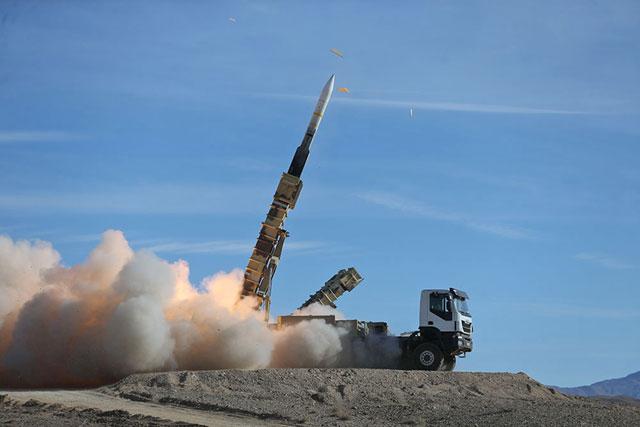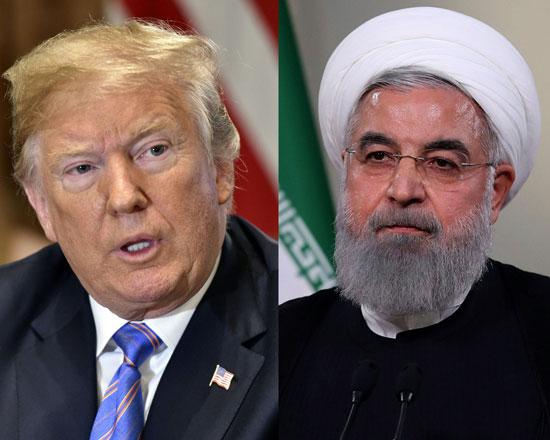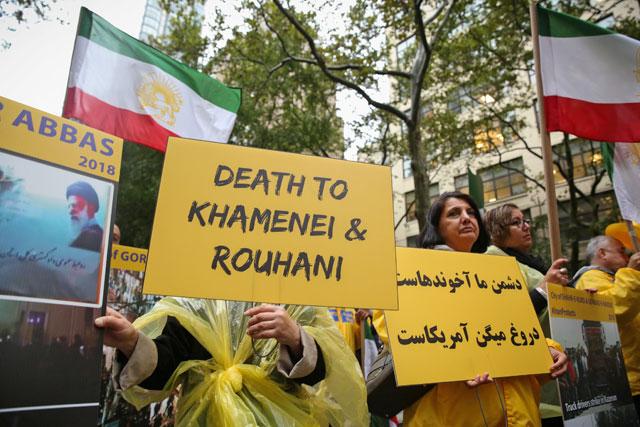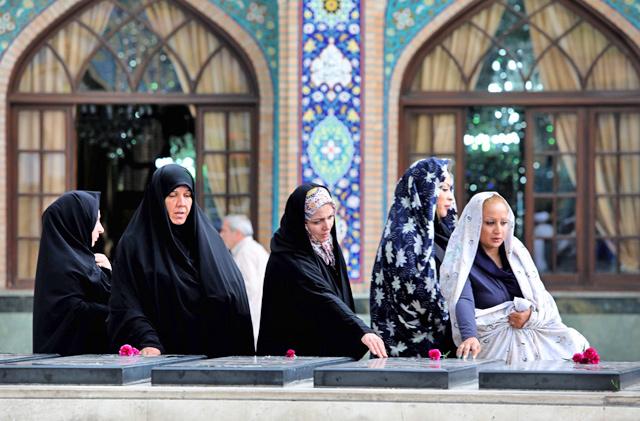You are here
US reimposes tough curbs on Iran, Tehran hits at ‘bullying’
By Reuters - Nov 05,2018 - Last updated at Nov 05,2018

A handout photo made available by the Iranian army office shows, Sayad missile fires from Talash missile system during the air defence drill in an undisclosed location in Iran on Monday (AFP photo)
WASHINGTON/DUBAI — The United States imposed strict sanctions targeting Iran’s oil, banking and industrial sectors on Monday and threatened more action to stop Tehran from pursuing “outlaw” policies, steps the Islamic republic condemned as economic warfare and vowed to defy.
The measures are part of a wider effort by US President Donald Trump to curb Tehran’s missile and nuclear programmes and diminish the Islamic republic’s influence in the Middle East, notably its support for proxies in Syria, Yemen and Lebanon.
“The Iranian regime has a choice: it can either do a 180-degree turn from its outlaw course of action and act like a normal country, or it can see its economy crumble,” US Secretary of State Mike Pompeo told reporters.
“We hope a new agreement with Iran is possible,” he added. “Rest assured, Iran will never come close to getting a nuclear weapon on President Trump’s watch.” Pompeo said.
The move restores, and strengthens, sanctions lifted under a 2015 international agreement on Iran’s nuclear programme from which Washington withdrew in May at Trump’s behest.
In a statement, US Treasury Secretary Steven Mnuchin said the move “should make clear to the Iranian regime that they will face mounting financial isolation and economic stagnation until they fundamentally change their destabilising behaviour”.
The sanctions target Iran’s vital oil industry, although major customers such as China and India were given temporary exemptions. They also cover 50 Iranian banks and subsidiaries, more than 200 persons and vessels in its shipping sector, Tehran’s national airline, Iran Air, and more than 65 of its aircraft, the Treasury statement said.
In reaction, a senior Iranian official who declined to be identified said Tehran was not concerned about the sanctions and will not yield to pressure to change its policies.
Hours earlier, Iranian President Hassan Rouhani said Iran would to continue to sell its oil despite Washington’s “economic war.” Foreign Minister Mohammad Javad Zarif said US “bullying” was backfiring by making Washington more isolated, a reference to other world powers opposed to the initiative.
European powers that continue to back the nuclear deal said they opposed the reapplication of sanctions and major oil buyer China said it regretted the move.
The sanctions move intensifies a campaign by Trump to force Iran to further limit its nuclear work and halt a missile program, as well as end its support for proxy forces in Yemen, Syria, Lebanon and other parts of the Middle East.
Trump’s national security adviser, John Bolton, said in an interview with Fox Business Network that more sanctions would be coming but he gave no details.
Howard Mendelsohn, a former US Treasury acting assistant secretary for intelligence and analysis, said the sanctions sent a tough message that anyone dealing with Iran will face consequences even if a company or individual is not sanctioned.
“This looks very disruptive,” said Mendelsohn, chief client officer for Kharon, a sanctions data and analytics firm. “It looks like a very serious, very comprehensive action targeting major sectors that are critical for Iranian economic viability.”
Switzerland said it was holding talks with the United States and Iran about launching a humanitarian payment channel to help food and drugs keep flowing to Tehran.
US sanctions permit trade in humanitarian goods such as food and pharmaceuticals, but measures imposed on banks and trade restrictions could make such items more expensive.
Pompeo said Washington granted exceptions to eight importers allowing them to temporarily keep buying Iranian oil. More than 20 nations had already cut their oil imports from Iran, reducing purchases by more than 1 million barrels per day, he said.
Iran’s clerical rulers dismissed the curbs. “Today the enemy [the United States] is targeting our economy ... the main target of sanctions is our people,” Rouhani said.
Sanctions ‘illegal and unfair’
“America wanted to cut to zero Iran’s oil sales ... but we will continue to sell our oil ... to break sanctions,” Rouhani told economists, adding the sanctions were illegal and unfair.
“This is an economic war against Iran ... We are prepared to resist any pressure,” Rouhani said.
The Belgium-based SWIFT financial messaging service said it is suspending some unspecified Iranian banks’ access to its messaging system in the interests of the stability and integrity of the global financial system.
Trump announced in May his government was withdrawing from what he called the “worst ever” agreement negotiated by the United States. The other parties to the deal — Britain, France, Germany, China and Russia — say they will not leave.
The deal had seen most international financial and economic sanctions on Iran lifted in return for Tehran curbing its disputed nuclear activity under UN surveillance.
The European Union, France, Germany and Britain said they regretted the US decision and would seek to protect European companies doing legitimate business with Tehran.
Diplomats told Reuters last month that a new EU mechanism to facilitate payments for Iranian oil exports should be legally in place by November 4 but not operational until early next year.
The eight importers given temporary exceptions from the sanctions to ensure crude oil prices are not destabilised will deposit Iran’s revenue in an escrow account and the funds will be used for humanitarian purposes, according to US officials.
Oil prices rose as the sanctions went into effect, with international benchmark Brent crude up by more than $1 to a session high of $73.92 a barrel. US crude futures were up about one percent at $63.85 a barrel.
Prices rallied to near four-year highs in early October on expectations the imposition of sanctions would create a global supply shortage. However, news of the waivers last week sent prices lower as top buyers would continue to import Iranian oil.
Rouhani said even without the waivers Iran would still be able to sell its oil, semi-official Tasnim news agency reported.
The curbs come as the United States is focused on US congressional and gubernatorial elections on Tuesday. Campaigning in Chattanooga, Tennessee, on Sunday, Trump said his “maximum pressure” against Iran was working.
“Iran is a much different country than it was when I took office,” he said.
“They wanted to take over the whole Middle East. Right now they just want to survive.”
To keep the deal alive, the remaining parties to the Iran accord are trying to maintain trade with Tehran, despite scepticism that this is possible.
Related Articles
WASHINGTON/ANKARA — US President Donald Trump told Iran it risked dire consequences "the like of which few throughout history have suffered
NEW YORK — US President Donald Trump on Tuesday said he would not meet Iranian President Hassan Rouhani as world leaders gathered in New Yor
LONDON — Iran on Wednesday kept up a drumbeat of opposition to US demands for sweeping change in its foreign policy and nuclear programme, a


















